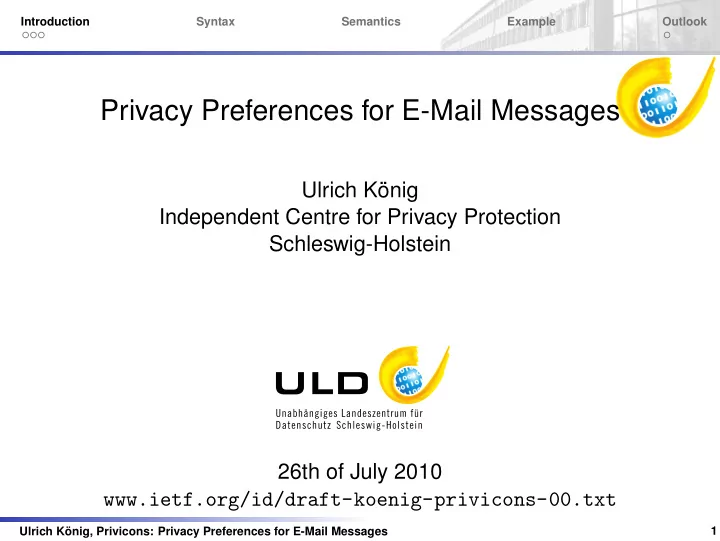

Introduction Syntax Semantics Example Outlook Privacy Preferences for E-Mail Messages Ulrich König Independent Centre for Privacy Protection Schleswig-Holstein 26th of July 2010 www.ietf.org/id/draft-koenig-privicons-00.txt Ulrich König, Privicons: Privacy Preferences for E-Mail Messages 1
Introduction Syntax Semantics Example Outlook People involved Max Senges, Ethan Forrest, Jan Schallaböck, Google Inc. Stanford University ULD Andreas M. Ryan Calo, Ulrich König, Braendhaugen, Stanford University ULD Designer, San Francisco Ulrich König, Privicons: Privacy Preferences for E-Mail Messages 2
Introduction Syntax Semantics Example Outlook Problem How to do you influence, what a receiver does with your email? ◮ Write prose? ◮ Include a disclaimer? ◮ Use digital restrictions management (DRM)? 3 Ulrich König, Privicons: Privacy Preferences for E-Mail Messages
Introduction Syntax Semantics Example Outlook Solution ◮ Include a standardized statement ◮ put statement at begin of email ◮ statement should ASKs the receiver nicely Ulrich König, Privicons: Privacy Preferences for E-Mail Messages 4
Introduction Syntax Semantics Example Outlook Syntax Privicons: Parsing order: ◮ [X] - Keep secret ◮ first-line in body ◮ subject line ◮ [/] - Don’t print ◮ [=] - Delete after reading ◮ header ◮ [=0] - Delete after reading ◮ [= I ] - Delete after I days ◮ [-] - No attribution ◮ [o] - Keep internal ◮ [>] - Please share 5 Ulrich König, Privicons: Privacy Preferences for E-Mail Messages
Introduction Syntax Semantics Example Outlook Semantics [X] - Keep secret ◮ keep the received e-mail message secret. [/] - Don’t print ◮ not print the received e-mail message. [= I ] - Delete after reading/ I days ◮ delete the e-mail message no later than a specified period of time. 6 Ulrich König, Privicons: Privacy Preferences for E-Mail Messages
Introduction Syntax Semantics Example Outlook Semantics [-] - No attribution ◮ not attribute, name or mention the original Sending User of the e-mail [o] - Keep internal ◮ present this e-mail message only to: ◮ people that are common friends ◮ part of a group of people are in a relation to both [>] - Please share ◮ share this e-mail message with everyone you like Ulrich König, Privicons: Privacy Preferences for E-Mail Messages 7
Introduction Syntax Semantics Example Outlook Example Mail From: Ulrich Koenig <ULD61@datenschutzzentrum.de> To: Jan Schallaboeck <uld62@datenschutzzentrum.de> Subject: [<] last update for privicons RFC [<] Please share Hey Jan, please check the IETF Website for our Privicons RFC! ;) best Uli -- [<] Please share The "Please share" Privicon asks the Receiving User to share this e-mail message with everyone she likes. 8 Ulrich König, Privicons: Privacy Preferences for E-Mail Messages
Introduction Syntax Semantics Example Outlook Outlook In Progress: ◮ Internet-draft ⇒ RFC ◮ implementing Thunderbird Plug-in ◮ GMail integration Ideas and Planing: ◮ Mailman integration 9 Ulrich König, Privicons: Privacy Preferences for E-Mail Messages
Introduction Syntax Semantics Example Outlook Thanks for your attention! Questions?! ;-) Internet Draft: www.ietf.org/id/draft-koenig-privicons-00.txt 10 Ulrich König, Privicons: Privacy Preferences for E-Mail Messages
Recommend
More recommend